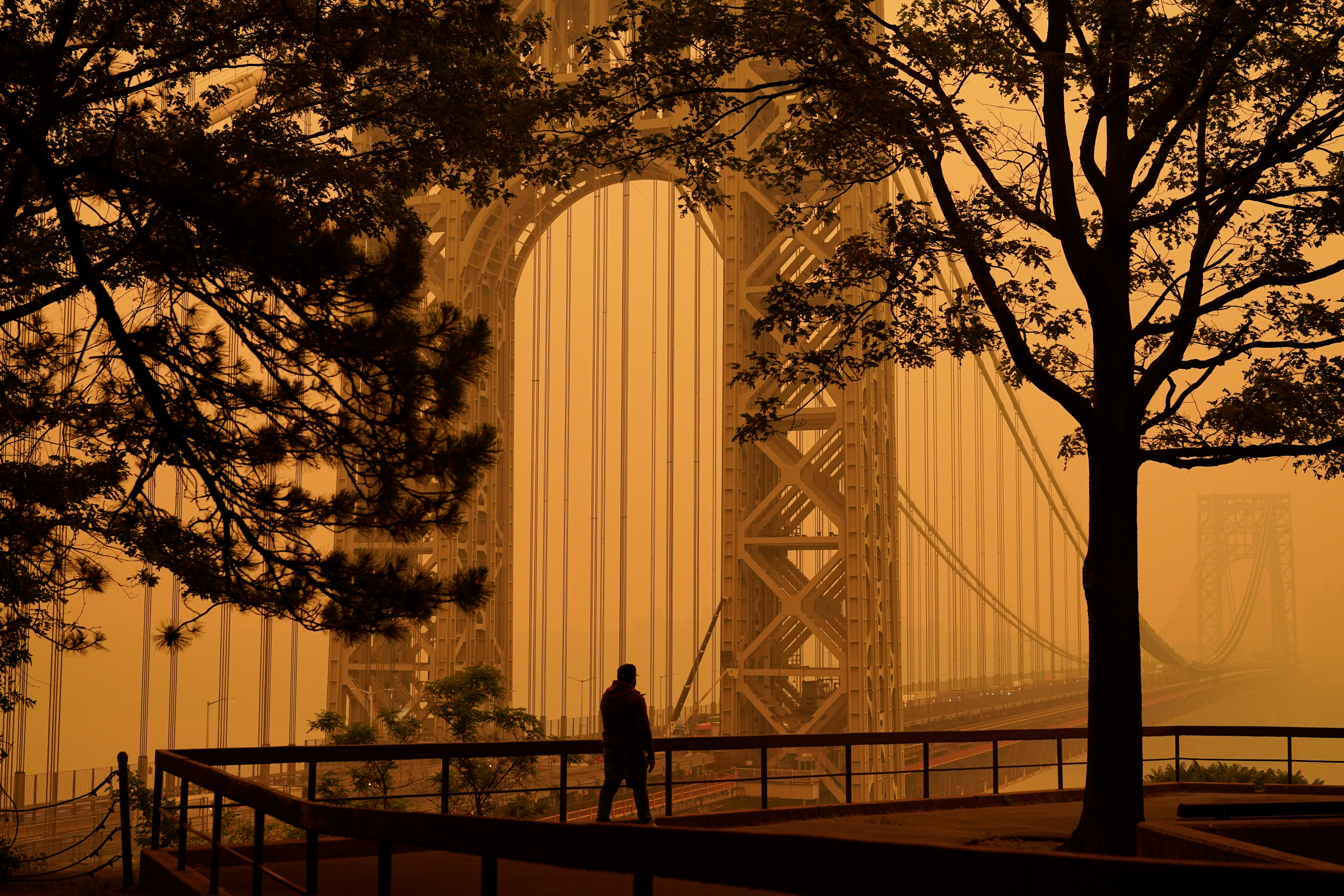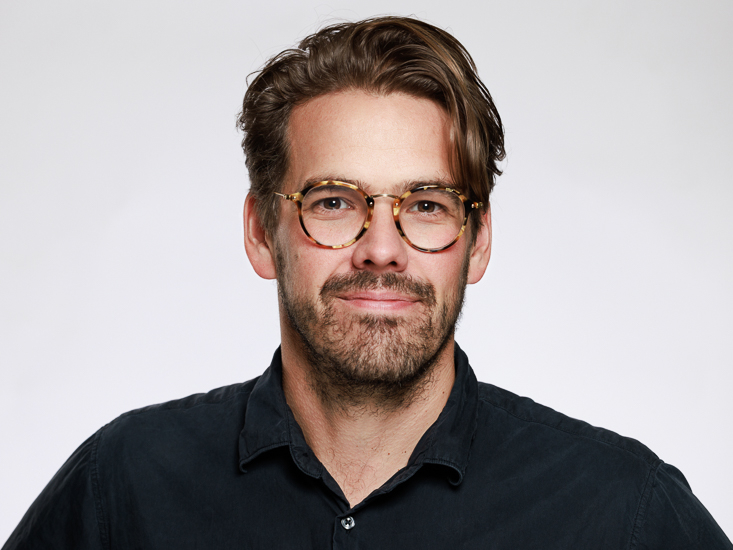Share post now
Reportage
Rooms with a view
06.12.2023, Finance and tax policy
In November, a large majority of UN member states agreed to a UN Framework Convention on Taxation. In the run-up, our tax policy expert toured the city of New York and the institution.

Intense Canadian forest fires envelop the George Washington Bridge in a haze that colours the sky a yellowish-grey.
© Seth Wenig / AP Photo / Keystone
I had picked up a pair of wellingtons at Zurich airport. A day before I landed in New York, the city was under water. A heavy autumn downpour had flooded large parts of the US metropolis on the Hudson. One airport had to be closed and subway tunnels had filled up. News reports around the world showed images of people sitting on traffic lights, staring down at swirling water, where restaurant furniture bobbed up and down and cars floated by. From a distance, one might have thought New York had been engulfed by the Flood.
The Global South in the northern metropolis
A day later, I sat with my colleagues from the Global Alliance for Tax Justice on the terrace of a Mexican restaurant in Midtown Manhattan, not far from the United Nations headquarters. We were in T-shirts – it was uncannily mild for early October. The next day we were to attend the deliberations of the Second Committee of the UN General Assembly, where representatives of 193 nations were discussing a new tax convention. There was not so much as a puddle to be seen in this part of the city. In an earlier email, our Indian colleague had put the globally covered, local weather event into perspective: "In my part of the world, we would call it a 'light monsoon shower'." Apparently, when transmitted via the web, the world sometimes looks even worse than it is in reality – at any rate when it comes to the weather.
But the fact is that New York's drainage systems are sometimes in such a poor state that they can no longer cope with even relatively small amounts of unusual rainfall. This is especially true of areas outside of Manhattan, the city's most developed and wealthiest section. My Indian colleague told me that she had spent the day in Midtown, rushing from one meeting to the next, completely undisturbed by the water. As such, rainfall in New York also shows up the inequities existing between the city's neighbourhoods.
Water poses a major problem for New York, especially in the long run, a subject that receives very little attention in global news coverage. Owing to climate change, the New York coastline has seen a sea-level rise of 30 centimetres since 1900. A further 1.5 metres rise is predicted by the end of the century. Heavy downpours will increase owing to rising temperatures over the Atlantic. The New York Times recently reported that the rising sea level will force 600,000 of the city's inhabitants out of their homes by the end of the century. Just imagine all of Zurich and Geneva disappearing into the sea.
Lack of money in the fight against water
Due to jetlag, I was already up at six o'clock during the first few days in New York, wandering around the city for a few hours before beginning our meetings with the UN representatives of various countries. I walked through old subway stations and along Brooklyn's semi-abandoned docks. Being so close to the sea, the neighbourhoods in the south of the city are the ones most exposed to flooding. The New York Times has reported, for example, that in Far Rockaway, a neighbourhood in the borough of Queens and home mostly to working and lower middle-class people, residents are already moving out to make way for the water. Away from the smooth and glittering facades in Midtown or the Financial District, infrastructure is in decline everywhere. In New York's public spaces, things are corroding and crumbling. It is hard to imagine the required adaptations to the rapidly changing climate being done in good time here, even though the city has an adaptation plan (AdaptNYC) and a sustainability plan (Plan NYC2030 – A Greener Greater New York).
Former police officer and now Democrat Mayor Eric Adams has just requested funds from Washington to assist migrants from Central and South America who are now arriving in New York in much greater numbers than in years past. The city lacks the funds needed to provide enough decent accommodation even for these people alone. Climate adaptation and migration spending are therefore two of the biggest challenges facing New York in the decades ahead. The "migration crisis" is also being blamed on irresponsible Republican governors in the southern United States. Some are sending new arrivals from Mexico directly to New York. Texas handed out New York-bound bus tickets to 42,000 immigrants, of whom 15,300 are thought to have already arrived. For current spending alone, the city faces a $8.3 billion shortfall for the rest of the year. In reality, this is absurd, as it is the world's richest city, and home to 340,000 millionaires, 724 people who own more than 100 million, and 58 billionaires. At the same time, poverty is also high: in 2021, almost a fifth of New Yorkers were living in poverty and a third were struggling to cover essential costs such as housing, food, education for their children, or health insurance.
While riding the cable car one morning from Roosevelt Island back to Midtown, I struck up a conversation with a young Wall Street computer scientist. Every morning, he, his wife and their young daughter take the cable car across the East River to Manhattan on their way to work and kindergarten. He must have been thinking of these social conditions when he told me that – having come from modest circumstances in Queens – they now live in a flat on the quiet, well-kept island. A privileged life. "But I'm still a long way from those over there", he said, pointing to the tops of the Midtown skyscrapers gleaming in the morning sun, "a very long way."
Extreme social inequality, significant climate risks but not enough funds for climate adaptation and adequate infrastructure for immigrants: in essence, this city is a society like those we know from emerging countries. The Global South also manifests itself in the North's most glitzy metropolis. To alleviate inequality and hardship among the poor and promote climate adaptation and mitigation, the city urgently needs more tax revenue. Higher taxes on large fortunes, corporations and capital gains could make a difference: 28 trillion dollars were traded on Wall Street in 2022. However, the smart spenders from the Office of Management and Budget hold sway in the city government, as reported by Politico.
EU orchids
My colleagues from the Global Alliance for Tax Justice and I had come to New York to do our part in helping to achieve success for a UN framework convention on tax policy, which could signal the demise the OECD as the dominant multilateral organisation for international tax policy. In a ten-year reform cycle, the club of rich Western countries has not managed to distribute corporate tax revenue more fairly, despite formally including some Southern countries in the process. The UN could change the dynamics entirely in this regard. I therefore spent a week going from country mission to country mission together with my Danish and New Zealand colleagues. Most of the missions are located in a semi-circle around the UN headquarters on the East River. We want to convince as many OECD Member States as possible to support calls from African countries for a framework convention to be drawn up. Our colleagues from Ethiopia and India are in dialogue with these latter countries.
However, not much could be achieved at the EU mission, whose office windows offer a view, over potted orchids on the ledges, all the way down Third Avenue to the "One World Trade Centre". One of their French representatives argued that there was "duplication" of OECD tax processes and a lack of tax policy expertise and resources at the UN. We were really not pleased to hear that because, first, a UN tax convention would be something completely different from the OECD's "Inclusive Framework", especially from the viewpoint of countries in the Global South that are producers for multinational corporations. Although the OECD now allows them to sit at the table, the rich Northern countries are still dominant. In the UN, however, the balance of power between North and South is more equitable. The matter of resources depends on the political will of the rich countries to endow the UN accordingly. Such "arguments" are therefore no more than rhetorical window dressing. Yet they are being wielded by most OECD countries. It is a way of disguising their material interests. The fact is that under a new UN tax system which fairly distributes tax revenue from the profits of multinational corporations around the world, the old corporate headquarters in the North would inevitably lose out. Global transparency in the offshore system for private assets would also complicate the business dealings of the traditional financial centres of the North. This is especially true of Switzerland, which, it is said in New York, would like nothing better than to drown that entire UN process in the East River. But there are also exceptions among the OECD countries. For high-tax countries such as Denmark or Norway, UN backing could also mean additional revenue. Accordingly, the conversation with the Danish representative at the impressive sushi restaurant was rather "hygge" – the Danish concept denoting a feeling of cosiness and contentment.
More "hygge" for the world
On the last day of my UN visit, I sat on a wide, soft armchair in a chilly foyer at the headquarters and wrote UN postcards from the 1980s. Qatar had set up shop there: the walls were lined with display cases containing golden oasis models. A floor-to-ceiling window façade offered a view of the East River and the ever-burgeoning skyscrapers on a Brooklyn waterfront. The ornate fitted carpet absorbed all sounds, and negotiators dozed in armchairs next to me. "The world is gripped by disasters and wars, yet here at the UN, international tax policy, at any rate, could soon become a little fairer," I wrote on a postcard. Perhaps the power brokers in the North will, after all, recognise the signs of the times overcome their love of the status quo and start sharing power and tax revenue more fairly. The world could indeed use a little more "hygge".
